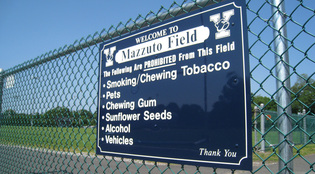 loading
loading
Light & VerityDonor's gift linked to fraud charge Mark Zurolo ’01MFAA gift from John Mazzuto ’70 helped pay for a new baseball practice field. But his former company wants the money back. View full image
The donor for whom the baseball team’s new practice diamond is named has been indicted for larceny and fraud—raising questions about the fate of his gift to Yale, which he is accused of essentially stealing. As a student, John Mazzuto ’70 played shortstop for the Bulldogs. As an alumnus, he built a successful business career. Starting in 2005, he donated about $1.5 million to Yale’s baseball program. When a practice field and the head baseball coach’s position were named for Mazzuto and his family in 2009, a Yale press release praised his “incredible generosity.” But what looked like generosity was actually “wholesale looting,” according to Manhattan district attorney Cyrus Vance Jr. ’77. In a May 25 press release announcing the indictment, Vance accused Mazzuto and a codefendant of stealing more than $60 million from their former company, Industrial Enterprises of America (IEAM). In January 2005, Mazzuto—who was CEO and president of IEAM—and his codefendant registered 15 million shares of stock that was supposed to be issued to employees, the indictment charges. Instead, prosecutors say, they issued “tens of millions of dollars’” worth of stock to “friends, families, alma maters,” and shell entities. The Yale gift—stock that the university sold before it lost its value—was among these transactions, prosecutors say. There’s no suggestion that the university knew about Mazzuto’s alleged wrongdoing. But the criminal indictment does raise questions about what Yale should do next. IEAM, which is in bankruptcy, asked Yale to return Mazzuto’s gift and then, after several months of discussions, told the Yale Daily News in April that it will sue to recover the money. “This case has been made more complicated by criminal charges in addition to the bankruptcy,” says President Richard Levin ’74PhD. “But rest assured that Yale will do the right thing at the appropriate time.” Spokesman Tom Conroy, in a statement, says the university cooperated fully with the criminal investigation “and is holding the donation aside,” but would not elaborate further. The indictment says Mazzuto filed for personal bankruptcy in 2002 and did not emerge until 2009. Levin declined to comment on whether Yale knew Mazzuto was in bankruptcy when he donated the stock. Bankruptcy is a matter of public record, but an institution would not typically check a donor’s bankruptcy record, says Rae Goldsmith, vice president for advancement resources at the Council for Advancement and Support of Education. “If you’re dealing with a donor you know well, you’re operating on good faith.” Yale is fighting return of a different gift affected by bankruptcy. BearingPoint Inc., a consulting firm, had paid $8.1 million of a $30 million pledge to the university before filing for bankruptcy in February 2009. In March, its liquidation trustee filed a request in bankruptcy court for return of the money. Yale said in a statement that it would “oppose the trustee’s efforts to undo BearingPoint’s performance of its commitments to Yale.” The university had “fully honored” its agreements with the company for an endowed professorship and executive training program, the statement added, “and relied on BearingPoint’s contractual commitment.” To be sure, the BearingPoint gift did not involve criminal charges. Occasionally, colleges do return gifts from donors who have committed wrongdoing. This May, Miami University of Ohio sent back $5 million after its donor, Tom Petters, was convicted of a giant Ponzi scheme. Some recipients of smaller gifts from Petters took his family name off buildings and programs. Mazzuto, of course, has not been convicted. His lawyer, Richard Asche, didn’t return a call for comment.
The comment period has expired.
|
|